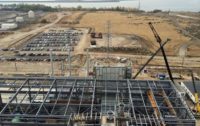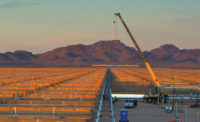Finance
Spanish Power Giant Abengoa Teeters
Design-build firm is shutting some global projects as it seeks pre-bankruptcy protection

The Solana solar power station in Arizona, built by Abengoa in 2013 and owned by the Spanish company, will remain in operation despite the firm's financial gyrations.
Photo credit: Abengoa
Facing a possible bankruptcy, the Spanish renewable-energy behemoth Abengoa has filed for preliminary creditor protection and, according to news reports, is winding down construction projects worldwide. The company now has less than four months to renegotiate with lenders. The U.S. government is its single-largest debt holder, through U.S. Energy Dept. loan guarantees for two solar powerplants in California and Arizona, but spokespersons for the facilities say they will remain in operation.
The move for protection by the Seville-based conglomerate, whose global labor force is more than 24,000 strong and spread across more than 50 countries, follows a nine-month loss posted last month and the collapse of a deal to have Gonvarri Corporacion Financiera, a unit of industrial group Corporacion Gestamp, buy a 28% stake.
The firm, through its construction subsidiary Abeinsa SA., ranks at No. 54 on ENR's list of the Top 250 Global Contractors, with more than $6 billion in global revenue, including $5.8 billion outside of Spain.
It is the second-largest contractor in the global power market, according to ENR data, and ranks first among worldwide builders in transmission and distribution, cogeneration and solar power. Abeinsa also ranks within the Top 25 in other building, power and environmental markets.If Abengoa goes through with the bankruptcy, it would be the largest in Spain’s history, according to numerous published reports. Its debt to Spanish and international banks reached, as of September, $21 billion, says Reuters.
In the U.S., DOE says Abengoa's cellulosic ethanol plant in Hugoton, Kan., has paid off its federal loan, but the company already has laid off its entire staff, according to Biomass Magazine. In Canada, the Spanish firm has been working on a $200-million contract to build transmission lines for renewable-energy transfer in Newfoundland and Nova Scotia. A representative at Emera, the parent of the owner-operator of the project, told media in early December that Abengoa was continuing its work there.
In Latin America, where Abeinsa is ENR's third-largest contractor, its parent quickly is closing down at least some of its operations—for example, laying off 2,300 people in Brazil on Dec. 2—but the company said it will maintain a staff of 400 employees nationwide in a bid to continue work on existing projects, according to the news agency EFE.
Unconfirmed online reports say the company was planning to close its operations in Brazil, Chile and Mexico, but, so far, only the Brazil shutdown has been confirmed.
In the Middle East, Abengoa was the lead on the $920-million Agadir desalination plant in Morocco, the largest in the region, but the fate of the project remains unknown, with Moroccan officials on Dec.1 saying they were not officially informed of Abengoa’s decision, according to Red Marruecos.
In Israel, Abengoa already withheld a $30-million financing payment on construction of a $1.1-billion thermo-solar plant in the southern Negev Desert, on which it was partnered with the country's largest construction company, Shikun & Binui Holdings Ltd. That firm confirmed to ENR that it is in talks with several European companies to replace Abengoa and complete on schedule what is set to be the country’s largest solar-thermal powerplant.
But even with the uncertainties, Abengoa last month announced project wins in Abu Dhabi to design and build a 220-MW cogeneration plant, the firm's first in the U.A.E., and a $200-million contract to build the largest combined-cycle plant in Jamaica.



